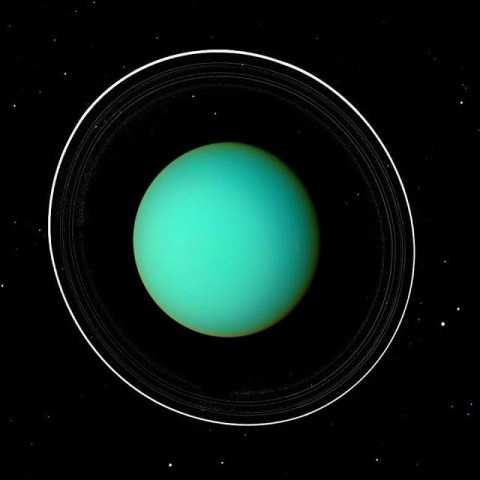Tread with care: Uranus smells like farts, rotten eggs
Planet’s cloud tops contain hydrogen sulphide giving it the disgusting odour

The composition of Uranus’s clouds has been a long and difficult challenge for scientists, notwithstanding the fact that we have learnt great detail about the other parts of our neighbour. PHOTO COURTESY: The Independent
The planet’s cloud tops are partly made up of hydrogen sulphide, the same chemical that gives rotten eggs on Earth their disgusting odour. As such, anyone who actually managed to arrive there would smell the pungent odour.
“If an unfortunate human were ever to descend through Uranus’s clouds, they would be met with very unpleasant and odiferous conditions,” said the University of Oxford's Patrick Irwin who is one of scientists who explored the planet’s chemical makeup.
But anyone doing so would have much bigger problems than the stench.
UAE plans to build first city on Mars
“Suffocation and exposure in the negative 200 degrees Celsius atmosphere made of mostly hydrogen, helium, and methane would take its toll long before the smell,” the scientist added.
The composition of Uranus’s clouds has been a long and difficult challenge for scientists, notwithstanding the fact that we have learnt great detail about the other parts of our neighbour.
The new research has revealed that stubborn mystery, revealing some of the makeup of the clouds that float over the planet’s surface.
The feat has been accomplished by using sensitive spectroscopic observations taken from the Gemini North telescope.
Through dissecting the infrared light coming back from Uranus, scientists were able to ascertain how its clouds were formed.
Scientists have argued over how the planet’s clouds were made up of hydrogen sulphide or ammonia. However, there has been no clear evidence or proof either way.
“Now, thanks to improved hydrogen sulphide absorption-line data and the wonderful Gemini spectra, we have the fingerprint which caught the culprit,” said Irwin.
The discovery means that Uranus is distinct from Neptune and Jupiter. Those other planets in our solar system show no hydrogen sulphide on their surface, instead showing ammonia floating above the clouds.
That difference was probably ascertained at the very beginning of our solar system and was determined by the way they formed.
“During our solar system’s formation the balance between nitrogen and sulphur [and hence ammonia and Uranus’s newly detected hydrogen sulfide] was determined by the temperature and location of planet’s formation,” explained Leigh Fletcher, a member of the research team from the University of Leicester’s Department of Physics and Astronomy.



















COMMENTS
Comments are moderated and generally will be posted if they are on-topic and not abusive.
For more information, please see our Comments FAQ